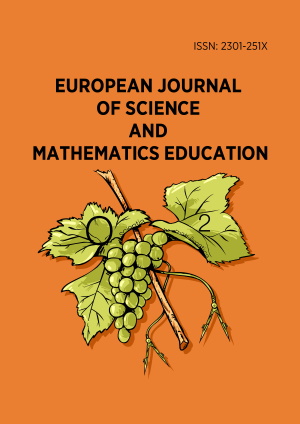Research Article
Problem-solving in a real-life context: An approach during the learning of inequalities
More Detail
1 CICS.NOVA, Faculdade de Ciências e Tecnologia, Universidade NOVA de Lisboa, Lisbon, PORTUGAL2 CIEd, Instituto de Educação, Universidade do Minho, Braga, PORTUGAL3 Escola Secundária José Gomes Ferreira, Lisbon, PORTUGAL* Corresponding Author
European Journal of Science and Mathematics Education, 12(1), January 2024, 21-37, https://doi.org/10.30935/scimath/13828
Published Online: 25 October 2023, Published: 01 January 2024
OPEN ACCESS 4018 Views 1716 Downloads
ABSTRACT
This study was conducted while 9th grade students learn to solve inequalities and seeks to understand their approach to solving problems with a real-life context. Specifically, the aim is to understand: (1) What are the main characteristics of the students’ approaches to the proposed problems? (2) What is the impact of the real context on the students’ resolutions? A qualitative and interpretative methodology is adopted, based on case studies, with data collected through documentary collection and audio recording of discussions between a pair of students while solving problems. The main conclusions suggest a trend to approach problems without establishing immediate connections with what was being done in the classroom, with students’ decisions being essentially guided by criteria of simplicity. The real context of the problems seems to have the potential to develop in students a more integrated mathematics, focused on understanding and not so much on the repetition of mechanical and meaning-independent procedures. The students’ familiarization with the context in question is one of the aspects highlighted by this study.
CITATION (APA)
Rocha, H., Viseu, F., & Matos, S. (2024). Problem-solving in a real-life context: An approach during the learning of inequalities. European Journal of Science and Mathematics Education, 12(1), 21-37. https://doi.org/10.30935/scimath/13828
REFERENCES
- Blum, W., & Niss, M. (1991). Applied mathematical problem-solving, modelling, applications, and links to other subjects: State, trends and issues in mathematics instruction. Educational Studies in Mathematics, 22, 37-68. https://doi.org/10.1007/BF00302716
- Bruder, R. (2016). Role of heuristics for problem-solving. In P. Liljedahl, M. Santos-Trigo, U. Malaspina, & R. Bruder (Eds.), Problem-solving in mathematics education (pp. 2-6). Springer.
- Chapman, O. (2006). Classroom practices for context of mathematics word problems. Educational Studies in Mathematics, 62, 211-230. https://doi.org/10.1007/s10649-006-7834-1
- Christiansen, B., Howson, A. G., & Otte, M. (1986). Perspectives on mathematics education. In B. Christiansen, & G. Walther (Eds.), Task and activity (pp. 243-307). Mathematics Education Library. https://doi.org/10.1007/978-94-009-4504-3
- Correia, E. (2005). Aprender matemática–Hoje ensino básico [Learning mathematics–Today basic education]. Universidade de Aveiro.
- Doorman, M., Drijvers, P., Dekker, T., Heuvel-Panhuizen, M., Lange, J., & Wijers, M. (2007). Problem-solving as a challenge for mathematics education in the Netherlands. ZDM, 39, 405-418. https://doi.org/10.1007/s11858-007-0043-2
- Freudenthal, H. (1991). Revisiting mathematics education. Kluwer Academic Publishers.
- Gerasimova, D., Miller, A. D., & Hjalmarson, M. (2023). Conceptual and procedural teaching: Does one teaching approach moderate the relationship between the other teaching approach and algebra achievement? Educational Studies in Mathematics, 114, 181-198. https://doi.org/10.1007/s10649-023-10219-y
- Godino, J., Batanero, C., Cañadas, G., & Contreras, J. (2015). Linking inquiry and transmission in teaching and learning mathematics. In K. Krainer, & N. Vondrová (Eds.), Proceedings of the 9th Congress of the European Society for Research in Mathematics Education. CERME.
- Gomes, F. M. (2017). Matemática básica [Basic mathematics]. IMECC-UNICAMP.
- Guzmán, M. (1986). Aventuras matemáticas [Mathematical adventures]. Labor.
- Kantowski, M. G. (1977). Processes involved in mathematical problem-solving. Journal for Research in Mathematics Education, 8(3), 163-180. https://doi.org/10.2307/748518
- Kilpatrick, J. (2010). Pólya e as capacidades matemáticas [Pólya and mathematical abilities]. Quadrante, XIX(2), 106-119.
- Lester, F. (1983). Trends and issues in mathematical problem-solving research. In R. Lesh, & M. Landau (Eds.), Acquisition of mathematics concepts and processes (pp. 105-131). Academic Press.
- Liljedahl, P., Santos-Trigo, M., Malaspina, U., & Bruder, R. (2016). Problem-solving in mathematics education. Springer. https://doi.org/10.1007/978-3-319-40730-2
- Lompscher, J. (1975). Theoretische und experimentelle untersuchungen zur entwicklung geistiger fähigkeiten [Theoretical and experimental studies on the development of mental abilities]. Volk und Wissen.
- Magro, F. C., Fidalgo, F., & Louçano, P. (2015). PI 9–Matemática 9.º ano [PI 9–Mathematics 9th grade]. Asa Editores.
- Pólya, G. (1975). A arte de resolver problemas [The art of solving problems]. Interciência.
- Pólya, G. (1981). Mathematical discovery: On understanding, learning and teaching. John Wiley and Sons.
- Pólya, G. (2003). Como resolver problemas [How to solve problems]. Gradiva.
- Ponte, J. P., Branco, N., & Matos, A. (2009). Álgebra no ensino básico [Algebra in elementary school]. Ministério da Educação - Direção-Geral da Inovação e Desenvolvimento.
- Rocha, H. (2020). Using tasks to develop pre-service teachers’ knowledge for teaching mathematics with digital technology. ZDM, 52(7), 1381-1396. https://doi.org/10.1007/s11858-020-01195-1
- Rocha, H. (2022). Pre-service teachers’ knowledge and the use of different technologies to teach mathematics. In A. Mesquita, A. Abreu, & J. Carvalho (Eds.), Perspectives and trends in education and technology (pp. 505-515). Springer. https://doi.org/10.1007/978-981-16-5063-5_42
- Schoenfeld, A. (1985). Mathematical problem solving. Academic Press.
- Schoenfeld, A. (1991). On mathematics sense making: An informal attack on the unfortunately divorce of formal and informal mathematics. In J. F. Voss, D. N. Perkins, & J. W. Segal (Eds.), Informal reasoning and education (pp. 311-343). Lawrence Erlbaum Associates.
- Verschaffel, L., Greer, B., & DeCorte, E. (2000). Making sense of word problems. Swets and Zietlinger Publishers.
- Yeo, J. (2017). Development of a framework to characterize the openness of mathematical tasks. International Journal of Science and Mathematics Education, 15, 175-191. https://doi.org/10.1007/s10763-015-9675-9
- Yin, R. K. (2009). Case study research: Design and methods. SAGE.


 The articles published in this journal are licensed under the CC-BY Creative Commons Attribution International License.
The articles published in this journal are licensed under the CC-BY Creative Commons Attribution International License.